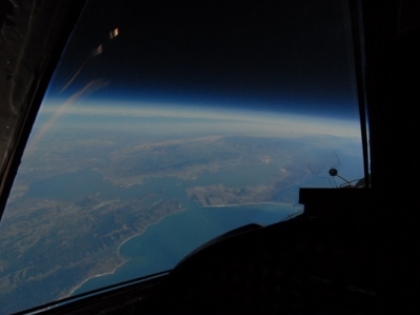One of the themes of this website—and, indeed, much of what I’ve written about adventure over the years—is the unpredictable places any adventure can take you. Most of my big adventures have come from what seemed a simple enough idea at the time. In 2001, for example, I only intended to go to Kenya to do a story on flying in the national game parks there. But that story started to fall apart (welcome to Africa), and I ended up having a chance encounter with two pilots in a coffee house in Nairobi who offered me another story opportunity … which ended up with my flying into a war zone, which, in turn, opened my eyes to a staggeringly complex world of war, politics, mercenaries, missionaries, and an international aid industry that bore little resemblance to any of my previous ideas on the subject.
Once you agree to take that first step on a journey or adventure, in other words (whether it’s physical, emotional, or personal) … you may find yourself in places, or compelled to explore new directions, that weren’t in the plan to begin with. That’s what makes adventure journeys so challenging and rewarding.
Take, for example, the search for the Great Yellow Duck.
Well, okay. It was really the search for 28,000 very little ducks, or “duckies” as they are often called. As in, the cute little toys that bob around children’s bathtubs squeaking water and eliciting squeals of delight from their 3-year-old owners. In 2005, a writer (and a senior editor at Harper’s magazine) named Donovan Hohn decided to go in search of 28,000 plastic yellow ducks (and frogs, beavers, and other bath toys) that had been swept off a container ship in 1992 en route from China, where they were made, to their U.S. destination.
The ducks started washing up on beaches along the Northwest coast of the U.S., and Hohn wanted to find out what had happened to the rest. That search led him to a far more complex destination than just the beaches of Alaska. Searching for the ducks leads him, in turn, to learn about ocean currents and what happens to detritus and pollutants in the water. Turns out, for example, that there’s an area of the Pacific Ocean, millions of square miles in area, that the currents turn into a kind of stagnant garbage dump. Hohn ends up traveling the Pacific, the Arctic, and even ends up tracing the ducks’ origins back to a factory in China, to see how they were made and what they were made of, getting far deeper in to the complex interactions of things in the world than I’m sure he ever intended.
Now, I’m not sure how he managed to get someone to pay for following those ducks to (literally) the ends of the Earth, but more power to him, however he managed it.
In any event, Hohn wrote a book about his travels that is, if nothing else, a chronicle about how adventure journeys often evolve, and the unexpected places they can take you … even if the plan and destination seemed simple at the start.
The title of Hohn’s book says it all: Moby Duck: The True Story of 28,800 Bath Toys Lost at Sea and of the Beachcombers, Oceanographers, Environmentalists and Fools (Including the Author) Who Went in Search of Them)
Seriously. You’ve gotta love a book called “Moby Duck” (brings Daffy Duck cartoons to mind) … and an adventure quest in search of nothing as momentous as a wooly mammoth or mastedon remains, or as lofty as the summit of Everest, but rather, just some little rubber duckies bobbing lost across the great oceans of the world.
This page contains an affiliate link.






It has always been the unexpected “detours” that give a trip spice. Speaking of Kenya and Nairobi, years ago while on a tour and ready to leave Nairobi the EgyptAir plane had overbooked and I was without a seat while the tour went on.
So I had an extra day/2 in Nairobi – staying at the Norfolk Hotel where Hemingway favored, and on my subsequent flight to Cairo instead of leaving the airport for Giza in a bus, I took a cab.
Going up that wide boulevard and suddenly seeing the Great Pyramid was a sight I won’t forget.
The ideal road trip, to me, is one where you don’t know where the day’s end will take you.
You let the river take you and enjoy the ride!